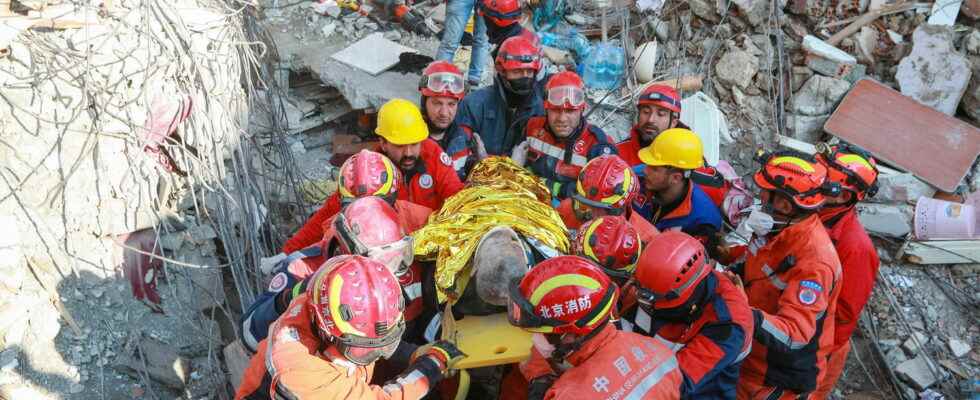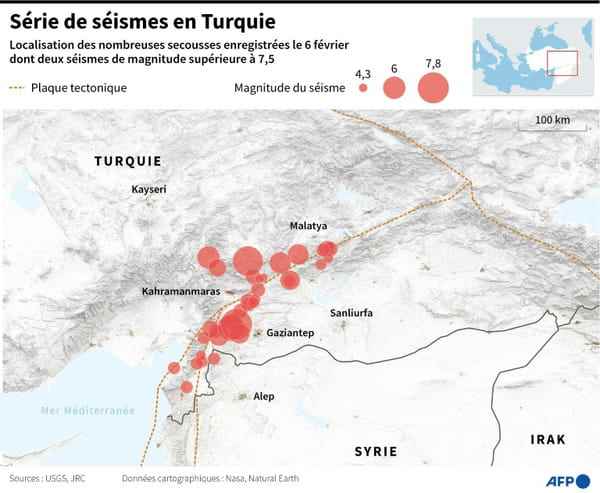TURKEY EARTHQUAKE. The still provisional toll of the earthquake in Turkey and Syria now exceeds 33,000 dead. Nearly 40,000 rescue workers are still on site to help and rescue survivors.
The human toll has exceeded 30,000 dead. Monday, February 13, a week after the earthquake that shook Turkey and Syria, the toll continues to rise and according to the latest official figures, 29,605 people died in Turkey in addition to the 3,574 deaths counted in Syria. This is without counting the victims injured during earthquakes or in the collapse of buildings.
With such a toll, which is still provisional, the earthquake in Turkey is one of the deadliest earthquakes of the century in the region. The number of deaths may still change, but to save as many victims as possible, more than 32,000 rescuers are still mobilized for rescue operations in addition to the 8,000 rescuers sent by the international community. Still, the more the days pass, the more the rescues are difficult, since the milestone of 72 hours has passed the chances of saving buried victims are dwindling day after day. The authorities could also soon decide to end the interventions in favor of the operations to clear thousands of tons of rubble. However, rescue teams and humanitarian aid are still needed to accompany survivors and families who have lost almost everything. According to the World Health Organization, 26 million people may have been affected in Turkey and Syria, including “about five million vulnerable people”. Faced with the urgency of such a situation, the WHO launched an appeal to raise 42.8 million dollars.
The rumblings of the Earth have done immense damage in Turkey but also in Syria. According to the latest official report released on Friday February 10, more than 33,000 people died as a result of the earthquakes, including 29,605 in Turkey and 3,574 in Syria. The number of injured has not been communicated but it amounts to at least more than 60,000 people. In addition to the physical victims of the earthquakes, the World Health Organization (WHO) estimates that 26 million people are at risk of being “potentially exposed” to the consequences of the earthquake in Turkey, “including around five million vulnerable people”. The same organization also fears that a major health crisis will occur after the natural disaster.
The damage is also material with several thousand buildings destroyed on both sides of the Turkish-Syrian border. More than 6,000 buildings and infrastructure collapsed during the earthquake or aftershocks in Turkey and that’s not counting the thousands of other cracked buildings that threaten to collapse in turn. The authorities plan in places to proceed with the voluntary destruction of the buildings to avoid making new victims.
Turkey has, in the hours following the earthquake, taken security measures and mobilized all its rescuers, more than 32,000 according to Afad, the official organization in charge of security. Turkish Interior Minister Süleyman Soylu has also issued a level four alert which involves a call for international assistance. Syria followed this example a few hours later.
Nearly fifty countries have come forward in the face of the emergency in Turkey and Syria. The first response was the dispatch of professional or volunteer rescue teams. The European Union was the first to provide humanitarian aid before several European nations followed suit. In addition to Europe and the United States, Ukraine and Russia, at war, have offered to send all “necessary aid”. As well as China via the Chinese foreign aid agency, India, Iran or Azerbaijan. In Israel, Prime Minister Benjamin Netanyahu “ordered all authorities to immediately prepare to provide medical assistance and relief” and “approved” the dispatch of aid to enemy country Syria.
After sending rescuers, financial funds are released to help the two countries affected by the earthquake. Washington released 85 million for Turkey and Syria. France has, for its part, planned to provide 12 million euros in emergency aid and London has released 4.3 million euros to help the intervention of peacekeepers.
The first earthquake in Turkey, that of magnitude 7.8, occurred in the district of Pazarcik, in the south-east of Turkey, located about sixty kilometers with the Syrian border and 17.9 kilometers deep according to the the American Institute of Geophysics (USGS). However, the force of the earthquake was felt even in neighboring countries such as Jordan, Lebanon and Cyprus.
A few hours later, the second earthquake started about a hundred kilometers from the epicenter of the first. With a magnitude of 7.5, the earthquake shook a large part of Anatolia: from Ankara and Diyarbakır, cities 670 kilometers apart from east to west, and from Malatya to Adana separated by 300 kilometers from north to south .

